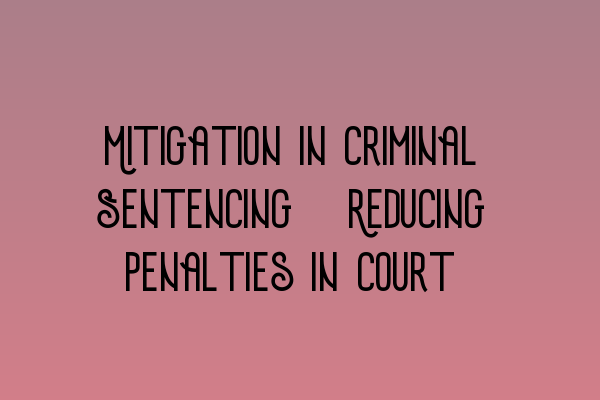Mitigation in Criminal Sentencing: Reducing Penalties in Court
When facing criminal charges, the outcome of your case largely depends on the sentencing handed down by the court. The severity of the penalties can have a significant impact on your life, reputation, and future prospects. This is why effective mitigation is crucial in criminal sentencing proceedings.
So, what exactly is mitigation and how can it help reduce the penalties imposed by the court? In this article, we will explore the importance of mitigation in criminal sentencing and provide you with some essential tips to consider. But before we dive into that, let’s briefly understand what criminal mitigation entails.
Understanding Criminal Mitigation
In criminal law, mitigation refers to the process of presenting evidence and arguments to the court in order to persuade the judge to impose a lesser sentence, minimize the consequences or tailor the penalty to better fit the circumstances of the case. Mitigation aims to humanize the defendant, demonstrate remorse, and provide reasons for a more lenient sentence.
When a defendant pleads guilty or is convicted of a crime, the judge considers various factors before determining the appropriate sentence. These factors may include the seriousness of the offense, the defendant’s criminal history, personal circumstances, and the impact of the crime on the victim and society as a whole. Mitigation is an opportunity for the defense to present evidence that may influence the judge’s decision and potentially result in a more favorable outcome.
The Importance of Mitigation in Criminal Sentencing
Effective mitigation can play a critical role in minimizing the penalties imposed. It allows the defendant’s legal team to present a comprehensive and persuasive case that addresses any aggravating factors while emphasizing mitigating circumstances. By highlighting factors such as a difficult background, personal struggles, mental health issues, or genuine remorse, the court can better understand the defendant as an individual and consider alternative sentencing options.
Mitigation is not about excusing the behavior or diminishing the seriousness of the crime committed. Rather, it aims to provide a balanced and fair assessment of the defendant’s circumstances, taking into account any appropriate mitigation that may warrant a lenient approach.
Effective Strategies for Mitigation
Successfully presenting mitigation requires careful planning and execution. Here are some key strategies to employ:
- Collaborate with experienced criminal solicitors: Seek expert legal advice from professionals who specialize in criminal law and have a deep understanding of the sentencing process. They can guide you on the best approach and help you gather relevant evidence to support your case.
- Gather supporting evidence: Compile evidence that demonstrates your personal circumstances, challenges you may have faced, and any efforts you have made towards rehabilitation. This may include character references, medical records, letters of apology, and documentation of community service or therapy.
- Develop a persuasive narrative: Craft a compelling story that humanizes you and emphasizes the factors that mitigate your actions. Present your case in a clear, concise, and logical manner to engage the judge’s attention and empathy.
- Show genuine remorse: Express sincere remorse for your actions and provide evidence of your commitment to change. This can include proof of participation in rehabilitation programs, counseling sessions, or community initiatives aimed at making amends.
- Highlight positive contributions: Showcase any positive contributions you have made to society, such as employment history, educational achievements, or involvement in charitable organizations. This can help establish your potential for rehabilitation and reintegration into society.
Remember, the success of mitigation depends on the strength of your legal team, the evidence presented, and the presentation of your case. By adopting a well-prepared and thoughtful approach to mitigation, you can increase the chances of achieving a more favorable outcome.
Conclusion
In summary, mitigation plays a vital role in criminal sentencing proceedings. Effectively presenting mitigating factors can potentially reduce the severity of the penalties imposed by the court. By collaborating with experienced solicitors, gathering supporting evidence, developing a persuasive narrative, showing genuine remorse, and highlighting positive contributions, you can strengthen your mitigation case and increase the likelihood of a more lenient sentencing outcome.
For further information on legal preparation and resources related to criminal law, please check out the following articles:
- SQE 1 Practice Exam Questions
- SQE 1 Practice Mocks FLK1 FLK2
- SQE 2 Preparation Courses
- SQE 1 Preparation Courses
- SRA SQE Exam Dates
At SQE Criminal Law & Practice Law UK, we are committed to providing comprehensive legal assistance and resources to help you navigate the criminal justice system. Our team of expert solicitors is dedicated to ensuring your rights are protected and your case is effectively presented. Contact us today for professional legal representation and guidance.
